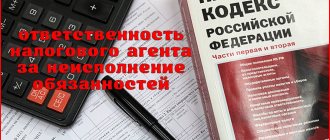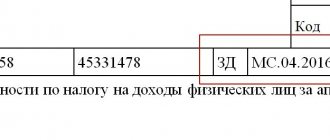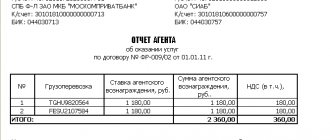Income in kind, insurance premiums in 2020: postings, Social Insurance Fund
A comprehensive explanation of the term “income in kind” (not cash income) is contained in the Labor and Tax Code of the Russian Federation. So, as Art. 131 of the Labor Code of the Russian Federation, it is allowed to pay wages to working citizens not only in cash equivalent - in rubles (permissible in foreign currency), but also not in cash. In the latter case, the following conditions must be met:
- The presence of mutual consent of the parties (employer and employee) on the payment of wages in kind, fixed in the contract.
- The share of salary in non-monetary form should not exceed the established limit - 20% of monthly earnings.
Income in another form that does not contradict the law may be accrued without applying limits. Thus, to non-cash income, as evidenced by Art. 211 of the Tax Code of the Russian Federation, include:
- payment by an organization (or individual entrepreneur) for an employee for goods (specific services, work), including his training, rest, food, etc. in accordance with this article;
- payment in kind for work performed by the employee;
- goods received by the employee;
- works performed in his favor;
- services provided to an employee free of charge or with partial payment.
In fact, generally obligatory insurance contributions are withheld from all income in kind referred to in the relevant applicable legal acts. Withholding and payment of contributions to extra-budgetary funds is carried out in a general manner, i.e. through the employer (the policyholder).
simplified tax system
The accrued salary (regardless of the form of payment) is taken into account in expenses when calculating the single tax (subclause 6, clause 1, article 346.16 of the Tax Code of the Russian Federation).
Situation: is the payment of wages in kind (goods, finished products, other property of the organization) subject to a single tax under simplification?
According to general standards, it is. But there are examples of court decisions that indicate the opposite.
The transfer of ownership of property is recognized as a sale (Clause 1, Article 39 of the Tax Code of the Russian Federation). Consequently, if an organization issues wages in kind, then it actually sells its property. This operation is subject to income tax (Clause 1 of Article 249 of the Tax Code of the Russian Federation, Resolution of the Federal Antimonopoly Service of the Volga Region dated March 1, 2007 No. A65-15982/2006). Thus, if you follow this position, the organization must reflect the value of the transferred property in taxable income (clause 1 of Article 346.15 of the Tax Code of the Russian Federation). In addition, if an organization applies a simplification of the difference between income and expenses, expenses can also be increased by the value of the transferred property (clause 2 of Article 346.16, clause 1 of Article 252 of the Tax Code of the Russian Federation).
However, the payment of wages to employees in kind is subject to regulation by labor law, not civil law. Therefore, such an operation cannot be recognized as a sale (see, for example, resolutions of the Federal Antimonopoly Service of the Ural District dated September 25, 2012 No. Ф09-8684/12, dated February 18, 2011 No. Ф09-11558/10-С2 and the West Siberian District dated January 18, 2006 No. F04-9650/2005(18711-A27-14)). Despite the fact that such arbitration practice is associated with organizations under the general regime, one can be guided by its conclusions under the simplified regime. Therefore, there is no need to pay a single tax during simplification.
In addition, labor costs themselves are one of the elements that form the total cost of production. The organization is obliged to charge a single tax on the cost of these products upon their sale. Charging taxes not only on the total cost of production, but also on its individual elements would mean double taxation of the same object. Therefore, if the value of property issued as wages is taken into account as part of labor costs, there is no need to charge a single tax on it when simplified.
However, if the organization is guided by this point of view, it may have to defend its position in court.
Situation: is it possible to take into account the payment of utilities for an employee when calculating the single tax? The organization pays a single tax on the difference between income and expenses.
Yes, it is possible if the organization is required by law to pay the employee’s utilities.
Simplified organizations take into account expenses in the manner prescribed for income tax payers (subclause 6, clause 1, clause 2, article 346.16 of the Tax Code of the Russian Federation). Payment of utilities for an employee can be taken into account in labor costs (clause 4 of Article 255, subclause 6 of clause 1 of Article 346.16 of the Tax Code of the Russian Federation). In this case, expenses must be documented (clause 1 of article 252, clause 2 of article 346.16 of the Tax Code of the Russian Federation). However, this possibility is provided only for cases where the obligation to pay utility bills for an employee is provided for by the legislation of the Russian Federation. These can be both federal and regional legislative acts for all areas of activity, and acts related to a specific industry. For example, Part 2 of Article 21 of Law No. 81-FZ of June 20, 1996 provides for the obligation of coal industry organizations to provide employees with free ration coal for heating according to the standards approved by the Government of the Russian Federation.
If the obligation to pay an employee the cost of utility services is not provided for by law, such expenses cannot be taken into account when calculating the single tax. The fact is that in the list of labor costs given in Article 255 of the Tax Code of the Russian Federation, such costs are not directly named. Based on paragraph 25 of Article 255 of the Tax Code of the Russian Federation, which allows other types of expenses incurred in favor of an employee to be included in costs, it is also impossible to take into account payment for utilities. This is explained by the fact that such payment is not related to the employee’s performance of job duties, and therefore is not economically justified (clause 1 of Article 252, clause 2 of Article 346.16 of the Tax Code of the Russian Federation).
Similar clarifications are contained in the letter of the Ministry of Finance of Russia dated April 15, 2013 No. 03-11-11/146.
When general mandatory contributions are withheld from income in kind
As is customary, the necessary taxes and fees are collected from the “salary” payments made by the employer to its employees. Thus, if income is “paid” within the framework of labor and civil law agreements, then, accordingly, mandatory contributions are withheld from it.
However, not all non-cash income of individuals is subject to such deductions. Remunerations that are recognized as the object of taxation specifically for generally obligatory contributions are designated by the Tax Code of the Russian Federation.
| What does the subject of contribution include? |
(main cases under Article 420 of the Tax Code of the Russian Federation)
(according to Article 422 of the Tax Code of the Russian Federation)
remuneration under GPC agreements;
(under the author's order agreement);
remuneration under alienation agreements for the result of intellectual activity and other agreements specified in Art. 420 Tax Code of the Russian Federation
compensation payments provided for by law, and clause 2 of Art. 422 Tax Code of the Russian Federation;
one-time financial assistance to victims of emergency situations (natural disasters, etc.), as well as at the birth, adoption of a child (or establishment of guardianship) and in the event of the death of a family member;
profit received from the sale of personal property (if owned for more than 3 years);
value expression of uniforms, uniforms and benefits provided to employees;
financial assistance no more than 4,000 rubles. per employee for the billing period;
amounts of payments (contributions) for voluntary personal annual insurance, as well as medical services, etc. in accordance with the article of the Tax Code of the Russian Federation
So, most non-monetary income, with some exceptions, may be subject to mandatory contributions. At the same time, the basis for calculating fees (in relation to Article 421 of the Tax Code of the Russian Federation) is defined as the cost of such income, equivalent to the market average. Prices are determined in accordance with the provisions of Art. 105.3 Tax Code of the Russian Federation. In other words, this is the cost of the product (service, work) on the date of payment, taking into account VAT and excise tax (for excisable goods).
It is noteworthy that the profit on which tax is not calculated is, in fact, non-taxable income in kind. As a rule, this is income received under a gift agreement (free use).
| Income of citizens not subject to general compulsory contributions |
| Salary according to the employment agreement; |
| State benefits, including unemployment and compulsory social insurance; |
| ★ Best-selling book “Accounting from scratch” for dummies (understand how to do accounting in 72 hours) > 8,000 books purchased |
Withholding of general mandatory contributions from gifts to employees
Gifts intended for employees can be different (monetary and non-monetary). It depends on the qualifications of this gift and how it is decorated and transferred to the recipient whether contributions need to be withheld from its value or not.
| Conditional classification of a gift | The procedure for its registration | Withholding of mandatory contributions |
| A gift not related to the work activity of the recipient |
(not compensation, does not depend on the employee’s work and length of service)
Transferred to the donee free of charge under a gift agreement
The corresponding taxes and contributions are withheld when the donor is an individual and the price of the gift is more than 3,000 rubles.
Gift - reward for work
(in relation to Article 191 of the Labor Code of the Russian Federation)
The necessary fees are collected from the value of the gift (equated to the amount of profit)
Withholding of mandatory contributions (compulsory pension insurance, compulsory medical insurance, compulsory social insurance) from gifts, where necessary, is carried out as follows. The amount of contributions (tax) is withheld from a cash gift when the money is given to the recipient employee from the cash register or transferred to his account (card).
If the gift is provided in kind, then contributions (taxes) are deducted from its value on the next payment day. This could be, for example, the day a salary is paid to the recipient employee. When no payments are expected in a particular billing period, fees from this gift are deducted at the end of the period, in the month following it.
Common mistakes when withholding mandatory contributions
Error 1. Compensation payments for employee meals are not subject to general mandatory contributions. This norm exists and is justified as follows.
Material benefits that an employer provides to its employees (including free food) are not considered remuneration for work. Simply put, they are in no way connected with the performance of workers’ duties. Accordingly, their value expression is not subject to general compulsory contributions.
Error 2. The cost of bottled water consumed by them in the organization should not be included in the in-kind income of employees.
Rationale: the employer is obliged to create appropriate working conditions for his employees. This norm is enshrined in the collective agreement. Therefore, the expenses of the organization that went to pay for bottled water are expenses to provide the necessary working conditions.
Mistake 3. An employer must adhere to a certain procedure when purchasing gifts for his employees. The following actions of the employer are considered correct.
It is necessary: it is necessary to conclude a purchase and sale agreement, draw up an estimate of the expenses incurred, issue an order (indicating the circle of persons responsible for issuing gifts, as well as their cost and terms of issuance).
The very fact of the acquisition of all gifts, i.e. their purchase, must be documented, for example, using a standard invoice or an appropriate acceptance certificate.
Registration of “in-kind” income of workers
Additional income an employee receives in addition to the “regular” salary is registered in the program using the document “Personal Income Tax and Unified Social Tax - Income and Taxes” (see Fig. 1).
Rice. 1
Depending on the classification (see above), income is entered either only on the “Personal Income Tax: Income and Taxes” tab (if the income is not subject to taxation under the Unified Social Tax in accordance with paragraph 1 of Article 236 of the Tax Code of the Russian Federation), or on two tabs: “Personal Income Tax: Income and taxes" and "Unified social tax: income" - in other cases.
On the “Personal Income Tax: Income and Taxes” tab the following is indicated:
- employee who received income;
- date and month of receipt of income (the month is indicated in the column “Month of the tax period”);
- current date (in the “Registration period” column);
- income code - 2000;
- amount of income.
The remaining columns are not filled in.
On the “Unified Social Tax: Income” tab the following is indicated:
- employee who received income;
- month of income;
- in the column “Income Code” it is indicated either “Not subject to UST taxation according to clause 3 of Art. 236 of the Tax Code of the Russian Federation (payments from profits)” or “Is subject to the Unified Social Tax in its entirety”;
- amount of income.
Answers to frequently asked questions
Question No. 1: Do insurance fees deduct from gifts intended for children of employees for the New Year?
The Ministry of Labor of the Russian Federation provides detailed explanations on this issue in letter No. 17-3/B-335 dated 07/08/2015. In this situation, there are 2 possible scenarios.
If an organization independently purchases New Year's gifts for the children of its employees, then such expenses will not be subject to general mandatory contributions (reference to Part 1 of Article 7 of the Federal Law of the Russian Federation No. 212 of July 24, 2009). Justification: the children are not employees of this organization; the employer did not enter into an employment contract with them.
Another situation is also possible when the cost of planned gifts is paid to employees personally. Then, from this payment, general mandatory contributions will be withheld according to the general procedure.
Acting Director of the Department L.A. Kotov.
Question No. 2: An organization rents an office and there are 2 common parking spaces nearby. Sometimes, in addition to clients, employees of this organization park their personal cars here. Is parking in kind an income in this situation?
In the information presented, the emphasis is placed on the fact that everyone uses parking: clients, and partly some employees of the organization.
Apparently, the lease agreement does not indicate the specific license plate numbers of certain employees who are entitled to use the parking lot. Based on this, we can conclude that the use of parking may not be considered as income in kind.
Object of taxation of insurance premiums
The object of taxation of insurance premiums for organizations and individual entrepreneurs are payments and other remuneration accrued by them in favor of individuals within the framework of labor relations and civil contracts, the subject of which is the performance of work, the provision of services (Clause 1 of Article 7 of the Federal Law of July 24. 2009 No. 212-FZ).
Thus, if income in kind is accrued within the framework of the above agreements, it is necessary to subject such payments to insurance premiums.
If income in kind is accrued on other grounds, insurance premiums are not charged.
For example, if food or utilities are paid for by the employee, insurance premiums are assessed. And if, for example, payment for rest or training is made to a former employee or a person not connected with the party paying the income, an employment or civil contract, insurance premiums do not need to be charged.
Moreover, it is specifically stated that payments and other remunerations made within the framework of civil contracts, the subject of which is the transfer of ownership of property, or contracts related to the transfer of property for use, are not subject to insurance premiums, with the exception of certain contracts (clause 3, Article 7 of the Federal Law of July 24, 2009 No. 212-FZ). This means that income received on the basis of contracts for the donation of property or its gratuitous use is not subject to insurance premiums (Letter of the Ministry of Labor dated September 22, 2015 No. 17-3/B-473).
Additional topics:
Deductions: calculation to the Pension Fund for individual entrepreneurs in 2020 The legally established minimum wage for the current year...
Payment of insurance premiums for compulsory health insurance in 2020 Payments are transferred by payment order, where the code must be indicated...
Insurance premiums for individual entrepreneurs on a patent: contribution rates For individual entrepreneurs using the patent taxation system until 2020...
The concept of accounts payable in the budget and its reflection in accounting Accounts payable are obligations (debts) ...
1. Break time for rest and meals is not included in working hours and is not paid,…
As a general rule, wages are paid in rubles (Article 131 of the Labor Code of the Russian Federation). The share of wages that is paid in kind should not exceed 20% of the accrued monthly wage. Other income in kind can be accrued without restrictions. Are income in kind subject to insurance premiums?
Income tax
When calculating income tax, include the entire amount of accrued wages (regardless of the form of payment) as expenses (Clause 1, Article 255 of the Tax Code of the Russian Federation).
Situation: when calculating income tax, is it possible to take into account in labor costs wages paid in kind in excess of the established 20 percent of the accrued salary amount?
No you can not.
When calculating income tax, take into account wages paid in kind only in a part not exceeding 20 percent of the total amount of wages accrued to the employee (including bonuses, additional payments and allowances). This position is explained as follows.
As a general rule, the organization pays employees salaries in cash - in rubles. However, if certain conditions are met, part of the accrued salary can be paid in kind. In this case, the share of salary in kind should not exceed 20 percent of the total salary accrued to the employee for the month. This is stated in Article 131 of the Labor Code of the Russian Federation.
An organization can take into account the amount of accrued wages (including in kind) when calculating income tax as part of labor costs (clause 1 of Article 255 of the Tax Code of the Russian Federation). At the same time, Chapter 25 of the Tax Code of the Russian Federation does not contain rules limiting the extent to which wages in kind can be recognized as an expense. At the same time, prohibitions (restrictions) on the performance of certain actions established by law (including labor legislation) are also mandatory for tax purposes. This conclusion allows us to draw paragraph 1 of Article 11 of the Tax Code of the Russian Federation.
Consequently, wages paid in kind, in a portion exceeding 20 percent of the total amount of wages accrued to the employee, cannot be written off as labor costs.
Such clarifications are contained in letters of the Ministry of Finance of Russia dated September 6, 2013 No. 03-03-06/2/36774, dated March 24, 2010 No. 03-03-05/59, dated November 5, 2009 No. 03-03- 05/200.
Advice: there are arguments that allow organizations, when calculating income tax, to take into account wages paid in kind in a portion exceeding 20 percent of the total amount of wages accrued to the employee. They are as follows.
As part of labor costs, you can take into account the entire amount of accrued wages, regardless of the form in which it will be issued in the future (Article 255 of the Tax Code of the Russian Federation). By issuing wages in kind in amounts exceeding the specified standard, the organization violates only labor legislation. Chapter 25 of the Tax Code of the Russian Federation does not provide for any restrictions in this case. However, the organization will most likely have to defend this point of view in court. In arbitration practice there are examples of court decisions confirming this position (see, for example, the resolution of the Federal Antimonopoly Service of the Central District dated September 29, 2010 No. A23-5464/2009A-14-233). However, a stable arbitration practice has not yet developed.
Situation: is it possible to take into account the payment of utilities for an employee when calculating income tax?
Yes, it is possible if the obligation to pay utility bills for an employee is provided for by law.
Payment of utilities for an employee can be taken into account as part of labor costs (clause 4 of Article 255 of the Tax Code of the Russian Federation). In this case, expenses must be documented (clause 1 of Article 252 of the Tax Code of the Russian Federation). However, this possibility is provided only for cases where the obligation to pay utility bills for an employee is provided for by the legislation of the Russian Federation. These can be both federal and regional legislative acts for all areas of activity, and acts related to a specific industry. For example, Part 2 of Article 21 of Law No. 81-FZ of June 20, 1996 provides for the obligation of coal industry organizations to provide employees with free ration coal for heating according to the standards approved by the Government of the Russian Federation.
If the obligation to pay an employee the cost of utility services is not provided for by law, such expenses cannot be taken into account when calculating income tax. The fact is that in the list of labor costs given in Article 255 of the Tax Code of the Russian Federation, such costs are not directly named. Based on paragraph 25 of Article 255 of the Tax Code of the Russian Federation, which allows other types of expenses incurred in favor of an employee to be included in costs, it is also impossible to take into account payment for utilities. This is explained by the fact that such payment is not related to the employee’s performance of work duties, and therefore is not economically justified (clause 1 of Article 252 of the Tax Code of the Russian Federation).
Similar clarifications are contained in the letter of the Ministry of Finance of Russia dated February 16, 2012 No. 03-03-06/4/8.
Situation: is the payment of wages in kind (goods, finished products, other property of the organization) subject to VAT and income tax?
According to general standards, it is. But there are examples of court decisions that indicate the opposite.
The transfer of ownership of property is recognized as a sale (Clause 1, Article 39 of the Tax Code of the Russian Federation). Accordingly, if an organization issues wages in kind, then it actually sells its property. This operation is subject to VAT (subclause 1, clause 1, article 146 of the Tax Code of the Russian Federation) and income tax (clause 1, article 249 of the Tax Code of the Russian Federation). A similar point of view is reflected in the resolution of the Federal Antimonopoly Service of the Volga Region dated March 1, 2007 No. A65-15982/2006.
If you follow this position, the organization must charge VAT on the cost of the transferred property. In this case, you need to issue an invoice. In addition, recognize income from the transfer of property when calculating income taxes. Its cost can be reflected in expenses (clause 1 of Article 252 of the Tax Code of the Russian Federation). Depending on the type of property and the accounting policy applied, follow the provisions of Articles 318, 319 and 320 of the Tax Code of the Russian Federation.
However, the payment of wages to employees in kind is subject to regulation by labor law, not civil law. Therefore, such an operation cannot be recognized as an implementation. Therefore, there is no need to pay VAT and income tax on it. A similar point of view is set forth in the resolutions of the Federal Antimonopoly Service of the West Siberian District dated June 3, 2010 No. A03-12730/2009, dated January 18, 2006 No. F04-9650/2005(18711-A27-14), Volga District dated February 5, 2008 No. A65-15782/07-SA2-41, Ural District dated June 28, 2006 No. F09-5541/06-S2.
In addition, labor costs themselves are one of the elements that form the total cost of production. The organization is obliged to charge VAT and income tax on the cost of these products upon their sale. Charging taxes not only on the total cost of production, but also on its individual elements would mean double taxation of the same object. Therefore, if the value of property issued as salary is included in labor costs, there is no need to charge VAT and income tax on it. A similar point of view is reflected in the resolutions of the Federal Antimonopoly Service of the Ural District dated February 18, 2011 No. Ф09-11558/10-С2, the North-Western District dated February 10, 2006 No. A05-11177/2005-18, dated September 26, 2005 No. A44-1500/2005-15.
However, if the organization is guided by this point of view, it may have to defend its position in court. The only thing that is indisputable is the issue of non-assessment of VAT on agricultural products of own production transferred as payment for labor. But for this, the organization’s revenue from the sale of such products must be at least 70 percent of its total income. This is stated in subparagraph 20 of paragraph 3 of Article 149 of the Tax Code of the Russian Federation. Also, VAT is not charged when transferring property to employees, the sale of which is exempt from taxation (clauses 2 and 3 of Article 149 of the Tax Code of the Russian Federation).
An example of how to take into account the payment of wages in kind. General mode organization, accrual method
Torgovaya LLC paid manager A.S. Kondratiev receives part of his salary for April in kind. This possibility is provided for in the employment contract.
For April, the employee was accrued 16,000 rubles. According to Kondratiev’s application, he was given an iron (a product sold by the organization) worth 944 rubles as part of his salary. (including VAT - 189 rubles). This amount does not exceed 20 percent of the employee’s salary (944 rubles < 16,000 rubles × 20%).
The purchase price of the iron is 708 rubles. (including VAT - 108 rubles). Selling price – 1000 rubles.
Kondratiev has no rights to deductions for personal income tax. “Hermes” charges insurance premiums for pension (social, medical) insurance at general rates.
The contribution rate for insurance against accidents and occupational diseases is 0.2 percent. In tax accounting, the accountant takes into account contributions during the period of their accrual.
The deadline for issuing wages established at Hermes is from the 3rd to the 6th of the next month. Salaries for April were issued on May 6.
The Hermes accountant made the following entries in the accounting records.
In April:
Debit 44 Credit 70 – 16,000 rub. – Kondratiev’s salary was accrued;
Debit 70 Credit 68 subaccount “Personal Income Tax Payments” – 2080 rubles. (RUB 16,000 × 13%) – personal income tax withheld;
Debit 44 Credit 69 subaccount “Settlements with the Pension Fund” – 3520 rubles. (RUB 16,000 × 22%) – pension contributions have been accrued;
Debit 44 Credit 69 subaccount “Settlements with the Social Insurance Fund for social insurance contributions” – 464 rubles. (RUB 16,000 × 2.9%) – insurance premiums are charged to the Federal Social Insurance Fund of Russia;
Debit 44 Credit 69 subaccount “Settlements with FFOMS” – 816 rubles. (RUB 16,000 × 5.1%) – insurance contributions to the Federal Compulsory Medical Insurance Fund are accrued;
Debit 44 Credit 69 subaccount “Settlements for insurance against accidents and occupational diseases” – 32 rubles. (RUB 16,000 × 0.2%) – premiums for insurance against accidents and occupational diseases have been calculated.
In May:
Debit 70 Credit 90-1 – 944 rub. – goods were issued as payment for wages;
Debit 90-3 Credit 68 subaccount “VAT calculations” – 144 rubles. – VAT is charged;
Debit 90-2 Credit 41 – 600 rub. (708 rubles – 108 rubles) – the cost of the goods transferred to the employee is written off;
Debit 70 Credit 51 – 12,976 rub. (16,000 rubles – 2080 rubles – 944 rubles) – the rest of the salary was transferred to Kondratiev’s bank card.
When calculating income tax for April, the Hermes accountant included 20,832 rubles in expenses. (RUB 16,000 + RUB 3,520 + RUB 464 + RUB 816 + RUB 32). When calculating income tax for May, income includes revenue from sales in the amount of 800 rubles. (944 rubles - 144 rubles), and the cost of goods sold in the amount of 600 rubles is included in expenses.
Object of taxation of insurance premiums
The object of taxation of insurance premiums for organizations and individual entrepreneurs are payments and other remuneration accrued by them in favor of individuals within the framework of labor relations and civil contracts, the subject of which is the performance of work, the provision of services (Clause 1 of Article 7 of the Federal Law of July 24. 2009 No. 212-FZ).
Thus, if income in kind is accrued within the framework of the above agreements, it is necessary to subject such payments to insurance premiums.
If income in kind is accrued on other grounds, insurance premiums are not charged.
For example, if food or utilities are paid for by the employee, insurance premiums are assessed. And if, for example, payment for rest or training is made to a former employee or a person not connected with the party paying the income, an employment or civil contract, insurance premiums do not need to be charged.
Moreover, it is specifically stated that payments and other remunerations made within the framework of civil contracts, the subject of which is the transfer of ownership of property, or contracts related to the transfer of property for use, are not subject to insurance premiums, with the exception of certain contracts (clause 3, Article 7 of the Federal Law of July 24, 2009 No. 212-FZ). This means that income received on the basis of contracts for the donation of property or its gratuitous use is not subject to insurance premiums (Letter of the Ministry of Labor dated September 22, 2015 No. 17-3/B-473).
Payments for business trips
Let's focus on excess daily allowances. These amounts remained the same in 2020: from 700 rubles. within Russia and from 2.5 thousand for foreign trips. But in 2020, contributions will have to be calculated for exceeding these values.
This income tax rule also applies to large daily allowance contributions. Therefore, it is only a stretch to say about daily allowances that this is income not subject to insurance premiums.
For more information about this, see “How per diem is assessed in insurance premiums from 2020.”
Here’s something else that is not subject to insurance premiums and is directly related to business trips. These are the costs for:
- the path to the destination and back;
- airport taxes;
- commissions;
- way to the airport, train station (including transfers);
- baggage transportation;
- rental housing;
- mobile communications;
- fee for obtaining a foreign passport;
- visa fees;
- commission for currency exchange (check at the bank).
Similar rules on payments that are not subject to insurance premiums apply to members of the company's senior management bodies. When they come to a meeting of the board of directors, board, etc.
Civil contracts
In 2020, insurance premiums are not imposed on payments under civil contracts, for the purchase of property or property rights. As, indeed, under lease, loan, leasing, donation and other agreements, under which property and property rights are transferred for temporary use. An exception is contracts for construction, paid services, as well as copyright agreements. Payments under these agreements are subject to contributions. This follows from paragraph 4 of Article 420 of the Tax Code.
Prizes, pensions and scholarships
There is no need to charge insurance premiums when issuing prizes to customers, supplementing pensions to former employees, or paying scholarships under student contracts (including to full-time employees).
Material benefit
There is no need to pay insurance premiums for the material benefit that the employee receives due to savings on interest when receiving an interest-free loan from the employer.
Payments within the framework of labor relations
Let us repeat that Article 422 of the Tax Code of the Russian Federation establishes a closed list of payments that are exempt from insurance premiums in 2018. In particular, these are:
- state benefits that are paid in accordance with the legislation of the Russian Federation (subclause 1, clause 1, article 422 of the Tax Code);
- all types of compensation to employees determined by law within the limits established by the legislation of the Russian Federation. For example, severance pay within three times the average monthly salary (subclause 2, clause 1, article 422 of the Tax Code);
- amounts of one-time financial assistance to parents, adoptive parents or guardians upon the birth or adoption of a child. But only when such assistance is paid within the first year after birth or adoption and in an amount of no more than 50,000 rubles. for each child (subclause 3, clause 1, article 422 of the Tax Code);
- contributions for compulsory insurance of employees (subclause 5, clause 1, article 422 of the Tax Code);
- payment for training of employees for basic and additional professional programs (if the training is related to the professional activity of the employee and is carried out at the initiative of the organization) (subclause 12, clause 1, article 422 of the Tax Code), etc.
Non-taxable income in kind
When deciding whether to tax income in kind with insurance premiums, you must keep in mind that certain types of non-monetary income are not subject to contributions. Such income, in particular, includes (Article 9 of the Federal Law of July 24, 2009 No. 212-FZ):
- compensation payments established by law (for example, in the form of free provision of residential premises by virtue of the law, payment for utilities and food);
- the cost of travel for “northerners” to the vacation destination and back;
- the cost of uniforms and uniforms issued to employees in accordance with the law;
- amounts of tuition fees for employees in basic and additional professional educational programs.
A complete list of what is not subject to insurance premiums
For convenience, we will show which payments are not subject to insurance premiums in 2020, in the form of a table.
| Type of payment | Explanation |
| State federal, regional and local benefits | This includes unemployment benefits and other amounts required under compulsory social insurance. |
| All types of compensation from the state (within standards) | They may be associated with: • harm from damage to health; • free provision of housing, payment for housing and communal services, food, fuel or their cash equivalent; • issuing products or money in exchange; • payment for some sports nutrition and other attributes for professional sports; • dismissal (exception: a) compensation for unclaimed leave; b) severance pay and average monthly salary over 3 times the amount (six times in the northern territories); c) compensation to the manager, his deputies and the chief accountant in excess of three times the average monthly salary); • training, retraining and advanced training of personnel; • costs of the contractor under a civil agreement; • employment of those laid off due to layoffs, in connection with the reorganization or closure of an organization, individual entrepreneur, notary, lawyer, etc. • performance of labor duties, including moving to another place (exception: money for negative labor factors), compensation for dairy products , for unclaimed leave (when not related to dismissal). |
| Disposable mat. help | • people due to natural disasters or other emergencies for compensation for material damage or harm to their health, as well as victims of terrorist attacks in the Russian Federation; • an employee whose family member has died; • employees at the birth (adoption) of a child (including guardianship) in the first year. Limit: up to 50 tr. for each child. |
| Income of indigenous peoples from their traditional trade | Exception: wages |
| Amounts of insurance contributions | Includes: • contributions for compulsory personnel insurance; • contributions under contracts of voluntary personal insurance of employees with a period of 1 year for medical payments. expenses; • contributions under medical contracts. services to employees for a period of 1 year with licensed honey. organizations; • contributions under voluntary personal insurance contracts in the event of one's death/or harm to health; • pension contributions under non-state pension agreements. |
| Additional employer contributions to funded pension | Up to 12 tr. per year per employee |
| The cost of travel for workers from the northern territories to the place of vacation and back and baggage allowance up to 30 kg kilograms | If you are on vacation abroad, then the cost of travel or flights (incl. luggage up to 30 kg) is not taxed. |
| Payments from election commissions, referendum commissions, from election funds | To positions elected in the Russian Federation: from the President of the Russian Federation to the local level |
| Cost of uniforms and uniforms | Issued by force of law, as well as to civil servants. Free or with partial payment. Remains for personal use. |
| Cost of travel benefits | Provided by law to certain categories of workers |
| Mat. assistance to employees | Up to 4000 rub. per person per billing period |
| Payment for employee training | For basic and additional professional educational programs |
| Amounts to employees to pay interest on loans and credits | This means that the loan was taken for the purchase and/or construction of housing |
| Cash allowance, provision of food and things | Applies to the military, police department, fire service, heads of federal courier communications, employees of the penal system, customs authorities |
| Payments and other remuneration under labor and civil law contracts (including author’s orders) in favor of foreigners, stateless persons temporarily staying in the Russian Federation | Exception: when such persons are recognized as insured under Russian law |
Note that in many of the cases listed above, an employment agreement or a civil law contract allows you to issue not only money, but also some kind of bonus. Which insurance premiums are not subject to will be clear from the type of contract (agreement) with the person. In other cases, there are no premiums that are not subject to insurance contributions.
How to determine the amount of income in kind
If income in kind is subject to insurance premiums, it is necessary to determine the basis for calculating contributions in respect of such income. It is defined as the cost of goods or services established by the contract on the day of their payment, taking into account VAT and excise tax. In case of state regulation of prices for such goods or services, state regulated retail prices are taken as a basis (clause 6, article 8 of the Federal Law of July 24, 2009 No. 212-FZ).
On the territory of the Russian Federation, according to Article 131 of the Labor Code of the Russian Federation, salary payments are made in ruble currency. However, there are certain situations when the employer has the right to pay wages to his ward not in monetary terms, but in another material form. In this case, the “payment” should be no more than 20% of the monthly salary. Other natural income can be accrued without any limits. Then a corresponding question arises for the parties to the labor process: is natural income subject to insurance premiums?
Reimbursement for travel to work place
Compensation for travel to the place of work can be caused either by necessity (distance from populated areas, lack of public transport) or by the employer’s desire to improve working conditions.
And this circumstance directly affects the obligation to calculate personal income tax. In accordance with Art. 41 of the Tax Code of the Russian Federation, economic benefit is recognized as income. It can be expressed in cash or in kind. In Art. 210 of the Tax Code of the Russian Federation states that income in kind is taxed, and the base for calculating the tax is established as the market price of a similar product or service.
The key point in determining whether a benefit arises or not (and the tax itself) is the ability of the employee to independently get to the place of work.
In the event that an employee can arrive at his place of work by public transport, payment for organized transportation or compensation for travel will be subject to personal income tax. This position is reflected in many letters from the Ministry of Finance of the Russian Federation, including letter dated October 12, 2011 No. 03-04-05/6-728. To calculate the tax, you will need to keep personalized records of employees who used the passage.










